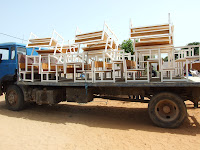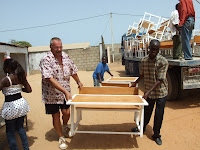
Imam Baba Leigh
Source: Front Page International blog |
|
By Saikou Jammeh, a Gambian journalist
The ‘disappeared’ Gambian Islamic scholar, who had been wildly
speculated to have died, has finally
appeared, alive and ticking. But, after
all, the astute cleric had neither been on a vigil. In fact, the past five
months that he’d been away, whether he was regularly saying his prayers, is a
question that is subjected to his confirmation.
For, Imam Baba Leigh was being kept against his will, arbitrarily,
in a secretly-shrouded place where not even his wife could access to him. The
Gambian state authorities, who had all along been telling the public,
unfaithfully, that the imam was not in their custody, is the culprit here.
The prolonged detention wasn’t just a violation of the
rights of the scholar, but it breaches Gambian constitution, which prohibits
detention of suspects, even of a common criminality, beyond 72 hours. Yet more
shocking is the government’s failure to give any genuine justification, legal
or moral.
No wonder when Baba Leigh, visibly weak and frail, was paraded
on the state-TV on Friday 10 April, following his release, he was a mere shadow
of his former assuming self.
The outspoken cleric is no stranger to arbitrary arrest and
detention, which in today’s Gambia,
has become a norm rather than an exception. It seems however, that the near a
half year of detention, without access to even a lawyer, is the stroke that perhaps
not broke, but painfully lacerated the proverbial camel’s back.
Uncharacteristic of him, Imam Leigh was economical of the
truth of the circumstances that surrounded his saga. He ironically praised the
state that put him under the trauma of detention, apparently in jails whose
conditions had been generally described as inhumane and degrading.
He even heaped blame on himself, and admittedly allowed to
be left holding the bag of guilt, for a ‘crime’ which the state authorities were
unable to muster courage to spill out, even after wallowing in Dutch courage
that was the apparent stage-managed episode.
‘I am a human being and mistakes cannot be avoided, but the
best human being is one, who makes mistakes, knows it and tries to rectify the
mistake,’ Baba Leigh was quoted as saying. The imam however, left the ‘mistake’
unsaid. So did the Presidential Affairs minister, Njogu Bah, who as the cliché
goes, roamed the bush before making his point, when he said:
‘When
you comment on issues that you don’t have clear facts on, whatever happens to
you, you are the cause of it…In the event that we cannot stay away from
commenting, let us say things that will add to the peace and stability in the
country, but not to comment on issues that can destabilise a country.”

















.jpg)


.JPG)





